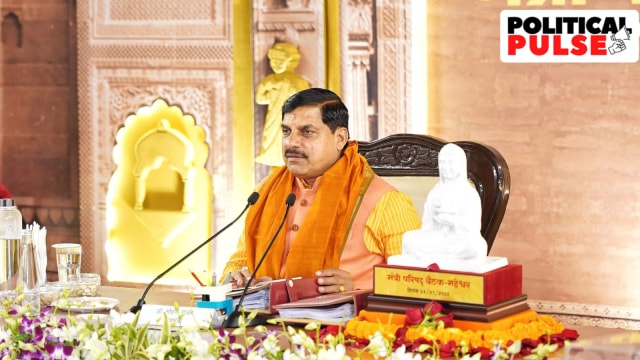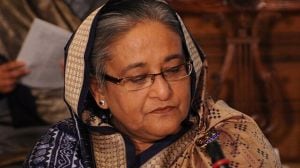As Madhya Pradesh bans liquor in 17 religious towns, why it is likely to be difficult to enforce
From Digvijaya Singh and Uma Bharti to Shivraj Singh Chouhan, several CMs since the 1990s have tried to introduce Prohibition in the state in various degrees but have struggled to implement it because of economic and cultural reasons.
 MP CM Mohan Yadav commemorating the 300th birth anniversary of Maratha ruler Devi Ahilyabai Holkar as part of which the liquor ban was announced. (PTI)
MP CM Mohan Yadav commemorating the 300th birth anniversary of Maratha ruler Devi Ahilyabai Holkar as part of which the liquor ban was announced. (PTI) Marking the 300th birth anniversary of Maratha ruler Devi Ahilyabai Holkar, Madhya Pradesh Chief Minister Mohan Yadav on Friday announced a prohibition on the sale of liquor in 17 religious towns in the state, including the CM’s hometown of Ujjain; Orchha; Salkanpur; Chitrakoot; Omkareshwar; Maheshwar; Maihar; Amarkantak; and the Pashupatinath temple area in Mandsaur.
The 17 towns consist of one municipal corporation, six nagar palikas (municipalities), six nagar parishads (urban councils), and six village panchayats. “In the first step to bring about an end to drinking in the state, liquor vends in 17 holy towns will be shut down. These shops will not be shifted elsewhere. Liquor shops will be completely shut in Ujjain Municipal Corporation limits,” Mohan Yadav told reporters, adding that the liquor ban in the five-kilometre periphery of the Narmada river will continue.
Over the years, Prohibition has been a constant talking point in Madhya Pradesh. In the 1990s, former CM Digvijaya Singh introduced a policy to remove or shift liquor shops if more than 50% of women from a particular locality gave their consent. The move was an attempt to reach out to women voters and grassroots organisations who had been agitating against domestic violence, poverty, and deteriorating public health. But the experiment unravelled quickly. The state’s enforcement machinery proved incapable of combating the rise in illicit liquor production and smuggling that followed.
Makhanlal Chaturvedi University’s former Vice-Chancellor Deepak Tiwari who has written on Madhya Pradesh’s political history said the policy was rarely enforced as district collectors were looking at maximising revenue from alcohol sales. Subsequently, Tiwari said, prohibition on liquor was introduced in selective places by Uma Bharti when she became CM in 2003. However, the policy could not continue owing to her departure from the CM seat in just eight months as a non-bailable arrest warrant was issued against her in connection with the 1994 Hubli riots case. In 2004, she was suspended from the BJP following a public spat with senior BJP leader L K Advani in front of the media at the party headquarters in New Delhi. For years after this, Bharti would rally against liquor shops in the state in protest.
After Bihar was declared a dry state in 2016, then Chief Minister Shivraj Singh Chouhan faced growing pressure from party members and protestors to adopt a similar stance. In 2017, Chouhan announced plans for a phase-wise closure of liquor shops as a first step toward statewide Prohibition. As part of his Narmada Sewa Yatra, he shut down 58 liquor shops within five kilometres of the Narmada and promised a blanket ban on alcohol sales in the state ahead of that year’s Assembly elections.
Chouhan’s stance on Prohibition was a way of building his base among women who were his core voters. He framed the policy as a moral crusade against the social evils of alcoholism, often invoking the imagery of a protective father figure safeguarding the dignity of his “daughters”. Yet, the state never enforced a complete ban.
Jayant Malaiya, the state’s finance minister at the time, addressed the state Assembly during the Monsoon Session and cautioned against Prohibition. He argued that banning liquor sales would significantly impact government revenues. Malaiya also pointed out that after Independence, Prohibition had been imposed in 10 states: Manipur, Nagaland, Gujarat, Andhra Pradesh, Haryana, Karnataka, Kerala, Tamil Nadu, and Bihar. Of these, Andhra Pradesh, Haryana, Kerala, and Tamil Nadu eventually lifted the ban, he pointed out.
Political analyst Rasheed Kidwai pointed to a lack of consistency in Madhya Pradesh’s liquor policies, describing them as “high on optics, low on substance”. He said alcohol remains a significant source of revenue for the state already facing fiscal challenges. Kidwai said the attempts to ban liquor in temple towns often result in smuggling or other corrupt practices, undermining the policy’s objectives. He noted that both Uma Bharti and Kamal Nath previously tried to limit liquor sales in religious areas but such measures failed to address the deeper cultural and economic issues at play.
Kidwai criticised the government’s new policy as “self-righteous” and said it was disconnected from stakeholders, arguing that effective alcohol policy requires broader dialogue and practical alternatives to reduce consumption without resorting to outright Prohibition.
The reality of liquor sales
Madhya Pradesh’s reliance on excise revenue is a reality that governments find difficult to ignore. Alcohol sales contribute between 15% to the state’s revenue, making it one of the largest sources of non-tax income, officials from the excise department said. According to the excise department, excise revenue was Rs 13,590 crore in 2023. In 2022, the excise department generated Rs 13,005 crore in revenue.
“These funds are critical for financing the state’s welfare schemes and infrastructure projects,” an excise official said.
Adding to the complexity of enforcing Prohibition are the state’s traditional liquor brewing practices. In many of the state’s tribal regions, brewing mahua liquor is both a traditional art and a source of livelihood. Efforts to impose blanket Prohibition have often sparked resistance from these communities, who view such measures as an attack on their cultural identity.
“This was the reason why Chouhan got cold feet because this issue had caused a lot of disquiet among the tribal communities who also harvest mahua and use it as a source of income. They are 21% of the voters in the state and can swing elections. A blanket ban on alcohol sales is simply not practically both politically and economically,” said a BJP functionary.



- 018 hours ago
- 028 hours ago
- 038 hours ago
- 048 hours ago
- 059 hours ago




























